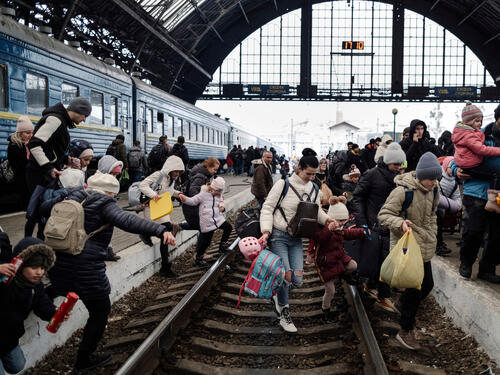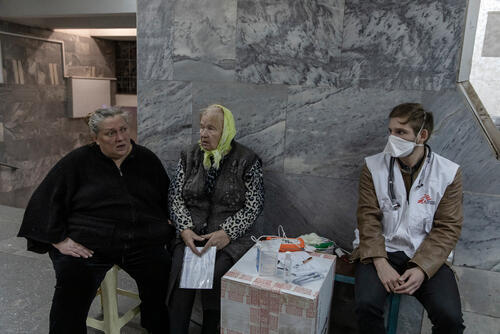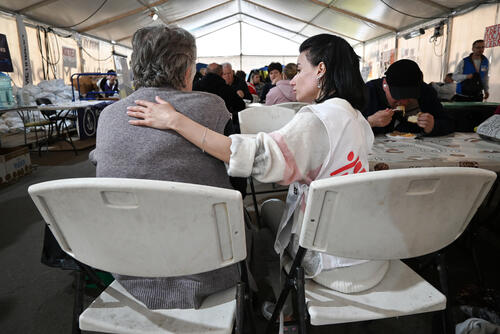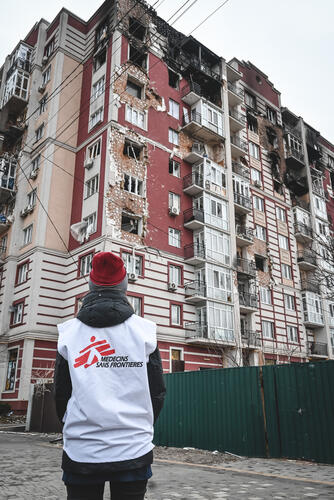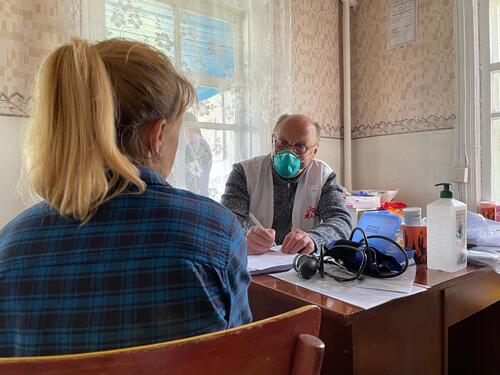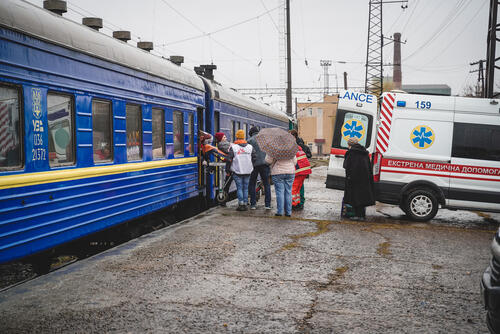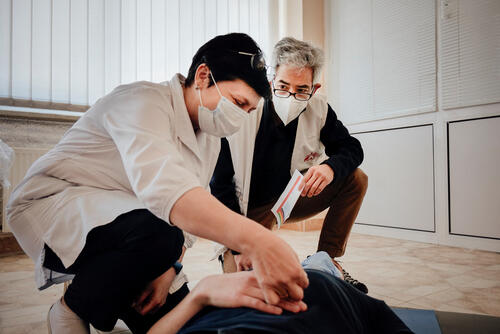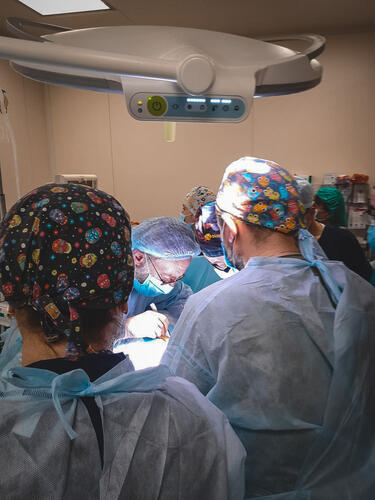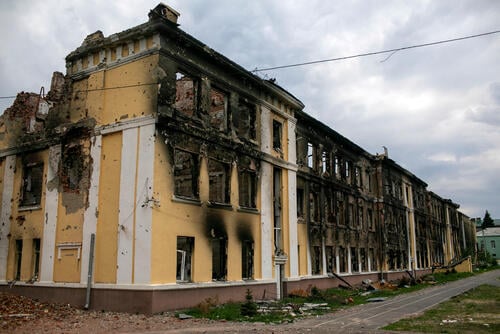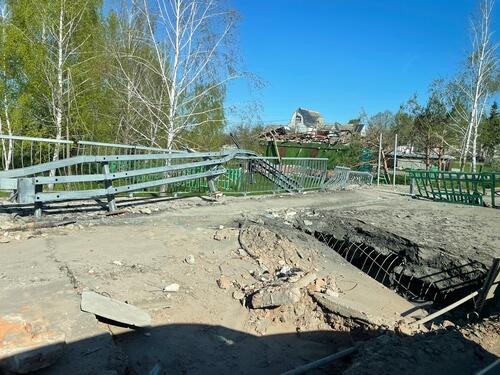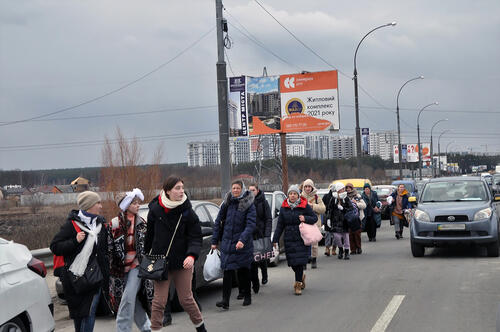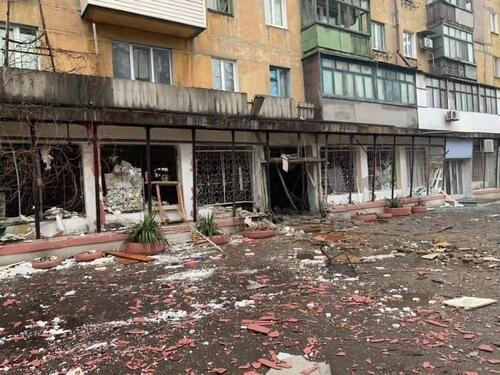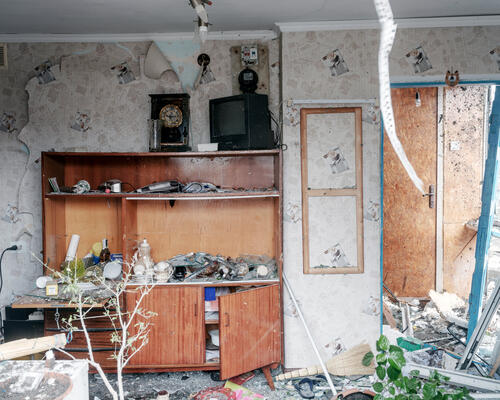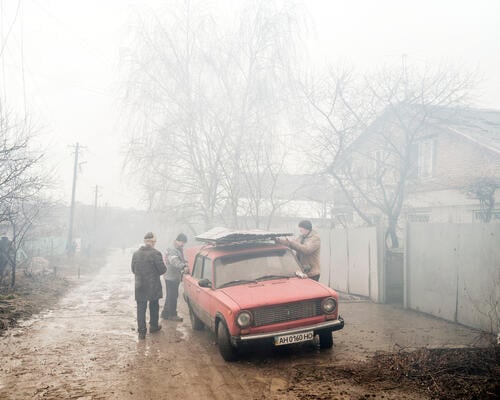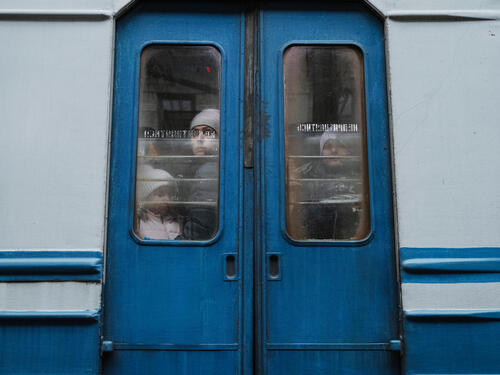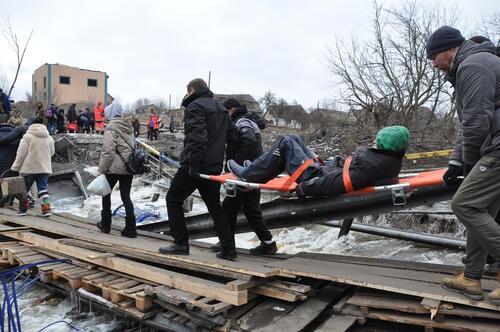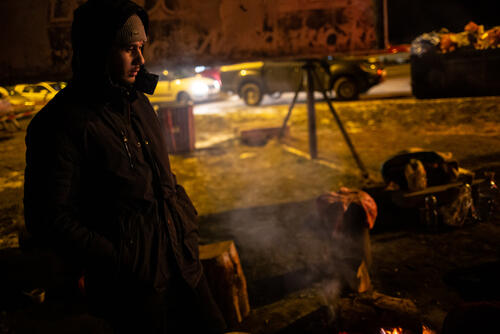Last update: 23 December 2022.
Overview
Following continuous low-level conflict in eastern Ukraine, in Donetsk and Luhansk oblasts (provinces) since 2014, in late February 2022, Russian forces attacked multiple cities across all of Ukraine, leading to full-scale war.
The intense fighting and shelling have led to 7.8 million people leaving Ukraine and becoming refugees across Europe.<p><span class="[ block ]">According to UNCHR: <a href="https://data2.unhcr.org/en/situations/ukraine/location?secret=unhcrrestricted.%20">Operational Data Portal, Ukraine Refugee Situation</a></span></p> Within Ukraine, over 6.5 million people remain displaced by the war.https://dtm.iom.int/ukraine MSF teams had been working in eastern Ukraine and have now suspended our usual medical activities, including our HIV and tuberculosis programmes.
As war continues across Ukraine and people flee, our teams are responding to a severe humanitarian crisis, both in Ukraine and in neighbouring countries.
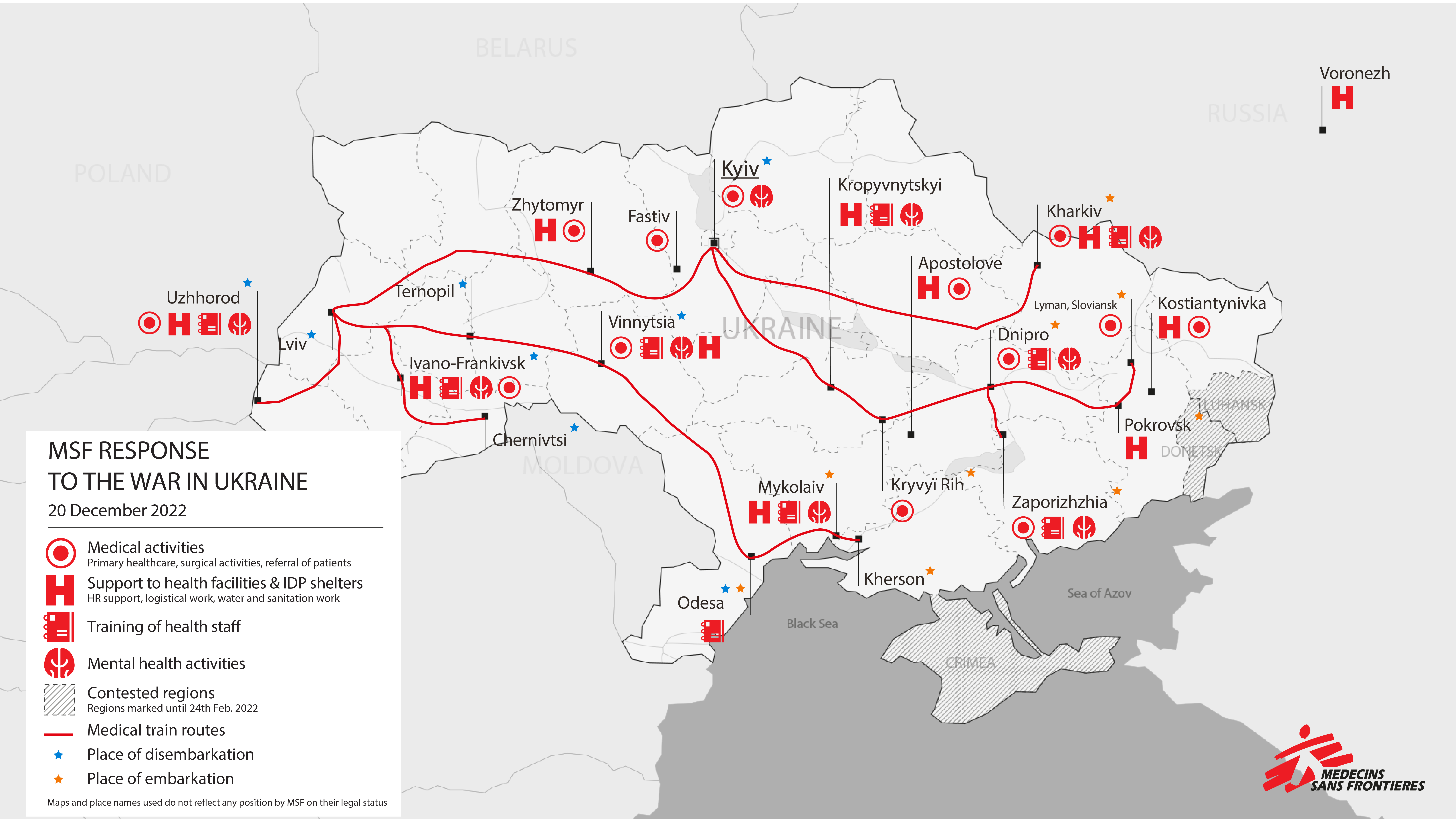
Ukraine
Across Ukraine, people remaining in cities under attack face incredible hardship; they often live without electricity, food or clean water, or medicines. Hospitals are consistently in danger of running out of supplies, especially for those for surgical, trauma, emergency room and intensive care unit needs. However, other key medical items are also needed, including insulin for diabetes patients, and medicines for patients with chronic diseases such as asthma, hypertension or HIV.
Since early October intense airstrikes have severely damaged Ukraine’s infrastructure, leaving nearly half of the power grid in need of repair. The consequences are recurring emergency blackouts as well as rolling power cuts in most parts of the country. These attacks coincide with the onset of winter and also impacts Ukraine’s healthcare system.
Many of the larger hospitals have been able to run on generators and back-up power systems, but ongoing military strikes hitting energy infrastructure make this less and less secure. In rural areas and smaller health facilities, this is an even greater challenge and working conditions for healthcare staff become increasingly difficult. Many households close to the frontline have been left without electricity, gas or heating for months.
MSF response
We currently have approximately 116 international and 685 Ukrainian staff working in response to the war in Ukraine. More staff, Ukrainian and international, join the team every day. They work as medical staff (surgeons, doctors, nurses); psychologists; in logistics and administration; and management.
Our teams are currently based in Apostolove, Dnipro, Ivano-Frankivsk, Kharkiv, Kyiv, Lyman, Lviv, Mykolaiv, Odesa, Poltava, Pokrovsk, Kochubeivka, Kostiantynivka, Kryvyi Rih, Uzhhorod, Kropyvnytskyi, Vinnytsia, Zaporizhzhia and Zhytomyr.
We are in contact with hospitals across the country, providing supplies and training as needed. MSF has now donated most medical supplies we had in the country; additional supplies continue to arrive.
Our current response includes:
Ukraine-wide
- Rushed over 800 metric tons of medical supplies and other relief items to Ukraine.
- Providing patient care on board two medical trains, developed with Ukrainian Railways. The medically equipped carriages help us to evacuate patients out of hospitals close to active war zones and refers them to hospitals away from the frontlines. One train provides basic medical care and can carry up to 50 patients. The other train is able to carry around 26 patients but is equipped to provide intensive care (ICU) for patients in serious condition. Between 31 March to 19 December, the two trains have evacuated 2,607 patients and 78 orphans.
Kyiv and surrounds
- In July, in the city of Kyiv, we began to provide physiotherapy services in a hospital managed by the Ministry of Interior. There are approximately 200 beds entirely dedicated to war-wounded people. The need for post-operative care is enormous as there are a high number of trauma patients at risk of developing long-term mobility issues without proper care. MSF physiotherapists work side by side with local health staff providing bedside training and creating local capacity for physiotherapy.
- Our teams in Hostomel, and other areas on the outskirts of Kyiv, continue to provide mental health and psychosocial support.
- We also provide self-care and psychological first aid training for railway staff, who often end up acting as psychological first responders, as they serve people who are evacuating from areas heavily affected by the war and who have suffered particularly difficult experiences.
Central Ukraine
- In Kropyvnytskyi, central Ukraine, an MSF team is providing medical donations, and training for health workers and first responders.
- Still in Kropyvnytskyi, we are distributing relief items in shelters for displaced people and carrying out mental health sessions with groups and individuals, both in the town and surrounding areas.
- We are also supporting a maternity hospital in Kropyvnytskyi to make services for survivors of sexual and gender-based violence (SGBV) more accessible.
- With the start of winter, we have supplied vulnerable families with kettles, heaters, firewood and other items to support them through the coldest months.
Southern Ukraine
- In Apostolove, an MSF team has been working with the local hospital to develop their emergency room and mass casualty response capacity.
- An MSF team based in Kryvyi Rih has started running mobile clinics providing basic healthcare, including sexual and reproductive health, mental health and health promotion.
- MSF ambulances also transfer patients to hospitals and between medical facilities around Kryvyi Rih and in the areas of the Kherson oblast that are under Ukrainian control.
- In Kochubeivka, we run a stabilisation point where patients are provided with initial treatment before being referred to hospitals. Many of the patients in this particular area have injuries as a result of landmine explosions.
- In Mykolaiv, we support several hospitals in the city with medical and logistic donations and water and sanitation services. Our teams have also provided training to hundreds of medical doctors and nurses to triage patients according to the severity of their injuries.
- We also provide mental health services in three sites in the rural areas around Mykolaiv, where we witness the extremely severe impact of war on the psyche of people.
- Also in Mykolaiv, our teams are providing basic healthcare services and psychological counselling through mobile clinics.
- In Kherson, MSF became the first international non-governmental organisation to arrive in Kherson city after it was retaken by Ukrainian forces. We have mainly been providing medical care for people with non-communicable diseases.
Northern Ukraine
- In Kharkiv, we run a hotline to respond to ongoing needs for medications and online medical and psychological consultations. Volunteers deliver the medication to people’s homes in the city and in the oblast.
- We provide medical and mental health activities through mobile clinics in and around Kharkiv city at various shelters hosting displaced people, providing primary care, including sexual and reproductive health, and psychological first aid and mental health consultations.
- In Kharkiv, the winter weather and lack of public transportation is making it more difficult for patients to travel to locations with healthcare. We are seeing an increase in acute diseases including upper respiratory tract infections and an exacerbation of asthma.
- In Zhytomyr, MSF teams are providing food parcels and hygiene kits and psychological support to tuberculosis (TB) patients.
- We continue to support the regional TB Hospital in Zhytomyr with donations of TB and other drugs, as well as laboratory consumables and food for patients.
- In collaboration with health authorities, MSF has recently started doing contact-tracing for children who have been in close contact with TB patients.
Eastern Ukraine
MSF has expanded our activities in eastern Ukraine in response to the growing humanitarian needs in areas close to the frontline and in places hosting people who have fled their homes.
- Our teams are providing basic relief items and run mobile clinics, providing medical consultations; continuation of care and medications for people with chronic illnesses; referrals to hospital for severely ill patients; mental health consultations to people who have fled parts of Donetsk and Luhansk oblasts and are now staying in around 40 shelters in and around Dnipro. MSF also provides consultations and referrals for people who have experienced sexual violence.
- In Dnipro, MSF also runs a clinic providing sexual and reproductive health services, including contraceptives and care for people who have experienced sexual violence, as well as health promotion, information and linking to services via social media.
- In Zaporizhzhia, teams run mobile clinics in the main reception centre and more than 30 shelters for people who have fled Mariupol, and other areas where fighting is intense, providing medical consultations; continuation of care and medications for people with chronic illnesses; referrals to hospital for severely ill patients; mental health consultations; and basic relief items to people.
- In addition we’ve developed, in coordination with the authorities, an emergency response capacity that aims at providing access to comprehensive healthcare for civilians when the frontline moves, which includes an advanced medical post in accessible areas close to the moving frontline.
- Mental health activities are also being increased and including workers close to the frontline as the burden of mental health trauma of the continued conflict gets heavier.
- We are providing supplies and training to health facilities close to the frontline in Donetsk oblast
- We are now focusing on supporting the emergency room in Sloviansk hospital - the only hospital to provide this service in the Donetsk oblast. In addition, we are also supporting the paediatric inpatient and outpatient departments in Sloviansk hospital.
- We are providing logistics and supplies for electricity and clean water to health facilities in Donetsk oblast
- An MSF team based in Donetsk and Luhansk oblasts provides surgical guidance, coaching and on-going training for hospitals across the oblasts.
- We run a hospital-to-hospital ambulance referral service out of Dnipro and Pokrovsk towns, transferring patients from hospitals near the frontlines to health facilities further away and to the medical referral train.
- Since February, we have donated medical supplies and/or provided in person or remote mass casualty training to Ukrainian medical staff working in numerous hospitals throughout eastern Ukraine. This includes hospitals in Bakhmut, Dnipro, Kramatorsk, Mariupol, Myrnohrad, Orikhiv, Pokrovsk and Zaporizhzhia.
- Working through a network of passionate volunteers we are supporting groups of vulnerable people who remain in their homes or in local community space, living underground in often dire conditions. Through this network we provide treatment for chronic diseases, donate essential items such as water as well as power banks to charge phones and lights.
Western Ukraine
- In Vinnytsia, we run mobile clinics in shelters, providing medical consultations, continuation of care and medications for people with chronic illnesses; referrals to hospital for severely ill patients; mental health consultations; and basic relief items to people.
- In Vinnytsia, we have rehabilitated part of a medical facility to host elderly people who are evacuated from the eastern frontline regions and require medical follow-up for chronic disease.
- In July we opened a physiotherapy project in a 60-bed hospital, providing bedside training and care, working to increase the local capacity to respond to an acute need similar to our approach in Kyiv.
- In Uzhhorod and Ivano-Frankivsk, we have provided training for local health professionals, including on mental health for psychologists and first responders, and have started group therapy sessions and individual mental health consultations with internally displaced people.
- In Ivano-Frankivsk we are supporting a clinic focusing on displaced people run by doctors who are displaced from the conflict themselves.
- In Uzhhorod we started running a mobile clinic for displaced people who are staying in public shelters.
- We are providing donations to health facilities and of non-food item kits for displaced people in nearby rural areas of Uzhhorod and Ivano-Frankivsk.
- Between July and November, MSF carried out 3,643 medical consultations through mobile clinics visiting 12 locations in Zakarpattia Oblast. The main medical conditions were chronic diseases and respiratory infections.
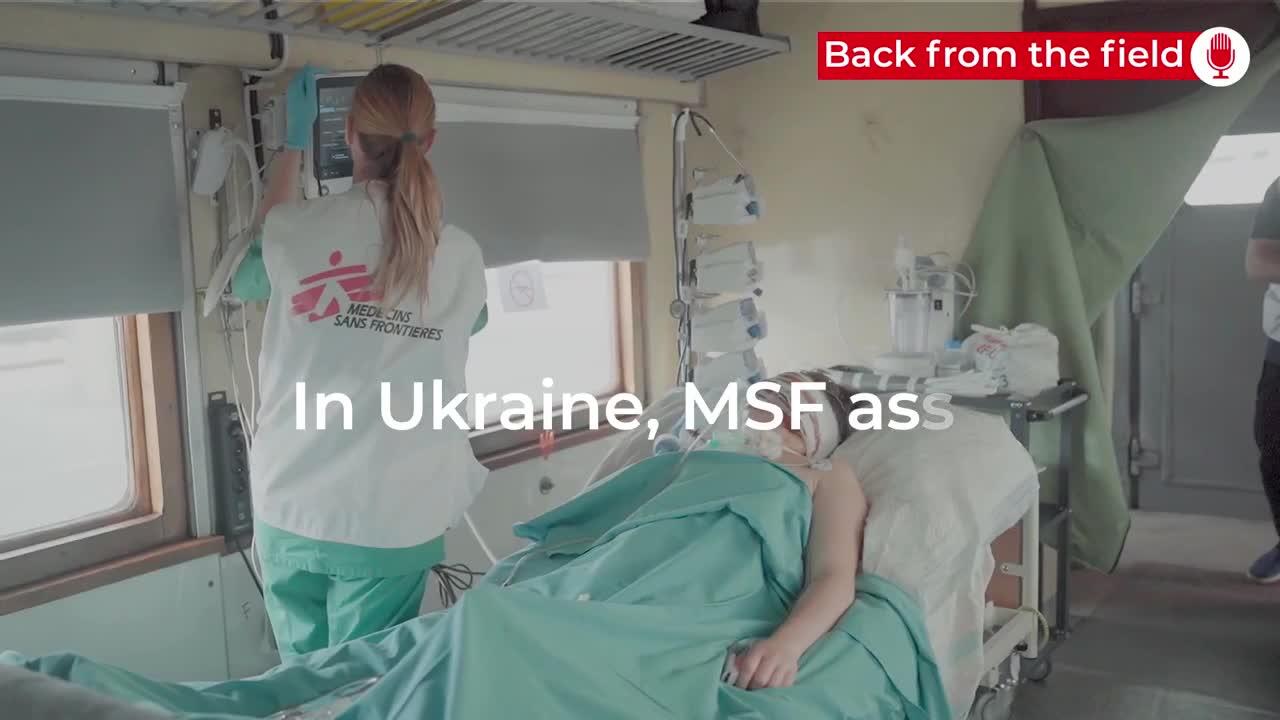
Back from the field - Diana Galindo
Other countries
Russia
MSF already works with health authorities in Arkhangelsk and Vladimir regions of Russia to reduce the burden of drug-resistant tuberculosis (DR-TB) and improve treatment.
- In Rostov and Voronezh, we have donated items such as food, hygiene kits and medicines to support some of the more than 270,000 refugees who have crossed into Russia.
- As of mid-October, MSF, with the support of local specialists, responded to the medical needs of more than 1,000 people on a case-by-case basis in Voronezh, Rostov-on-Don and Belgorod.
- In our projects in Moscow and Saint Petersburg, where we are partnering with local NGOs to support vulnerable groups, we’ve seen an increase of Ukrainian people living with HIV and hepatitis C who are stranded in Russia and cannot get refills for their antiretroviral medicines.
- We run a hotline to provide referral services to medico-social support to refugees and displaced people from Ukraine. As of end of August, MSF with the support of local specialists responded to the medical needs of more than 490 people on a case by case basis.
Belarus
- In Belarus, we are responding to the needs of patients from Ukraine, as well as other countries of origin, in Minsk, Grodno, Brest, Gomel, Mogilev and Vitebsk regions.
- Among our patients, there are many people with non-communicable and chronic diseases including diabetes and hypertension.
- In Belarus, our teams continue to run our regular programmes. We support the national tuberculosis programme in the civil and penitentiary sectors and hepatitis C treatment in prisons.
Poland
- MSF is actively working to support the Ministry of Health to provide treatment for patients with drug-resistant tuberculosis, including patients previously supported by MSF in Ukraine.
- MSF donated shelter-related items to the Red Cross in Lublin, Poland, located about 100 kilometres from the Ukraine-Poland border.
Closed projects
Hungary
In Hungary, we provided basic medical care and mental health care to refugees who crossed the border, via mobile clinics we ran in partnership with local organisations and with the support of Hungarian doctors.
Moldova
MSF had teams in Moldova at the border crossing points with Ukraine, to assess the situation of refugees who made their way across. Other activities included:
- In Palanca, on the southeastern border with Ukraine, we provided basic healthcare consultations and mental health first aid to people. We also provided basic needs, such as blankets, to refugees.
- On the northern border with Ukraine, in Otaci we ran a medical post where we provided basic healthcare and mental health care. We also trained local volunteers in providing mental health first aid to refugees.
- Our mental health team also provided mental health first aid to people in reception facilities in the capital, Chișinău.
- Also in Chișinău, we conducted assessments in different hospitals in the city to evaluate how to improve access to health care for refugees.
Slovakia
MSF previously worked in Slovakia training Ministry of Health staff on providing treatment for victims of sexual and gender-based violence and for TB and MDR-TB.



